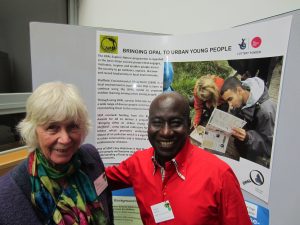Pakistani Elderly Men visit to Whirlowhall Farm
Pakistani Elderly Men visit to Whirlowhall Farm
Widening Participation in the Natural Environment
Pakistani Elderly Men visit to Whirlowhall Farm
SEM’s Maxwell Ayamba at The OPAL National Conference at Royal Botanical Gardens, London.
In October last year, the Guardian Newspaper published an article titled, “Morally and legally, the UK government has failed us on air pollution”. ClientEarth which wrote the article said ” it was taking the Government to court for lack of urgency and failure to tackle illegal levels of nitrogen dioxide as an ‘invisible killer’ because, for the most part, it goes unseen, with government estimating it causes 23,500 early deaths a year triggering heart attacks and strokes”.
Good air quality is essential for our health and for the well-being of our environment but not everyone has access. Direct monitoring of air pollution is expensive and too technical, that is why the use of some lichens which are sensitive to air pollution can tell us about the pollutants in the atmosphere around us. Research has established that it is people living in the most deprived communities especially Black & Minority Ethnic (BME) who suffer the most from worse air pollution due to their close proximity to these sources.

It is the more reason why the OPAL air survey which uses bio-indicators is considered so vital to help raise awareness among people from deprived urban communities about levels of air pollution. Peter Ainsworth, Chair of the Big Lottery Fund who was key note speaker at the conference emphasised how community-led projects such as OPAL are therefore so important.
The Sheffield Environmental Movement (SEM) which had a poster exhibition at the conference is one such community-led projects, using OPAL air survey to help raise awareness about the dangers of air pollution with young people in Sheffield. Maxwell Ayamba of SEM said, “we are already gathering evidence from engaging with young people through the OPAL air survey that they are oblivious to the dangers of air pollution because there have not been proactive outreach work to raise awareness”.
To have your citizen science cake and eat it? Delivering research and outreach through Open Air Laboratories (OPAL) (Lakeman-Fraser et al. 2016) Published in the BioMed Central Ecology Journal